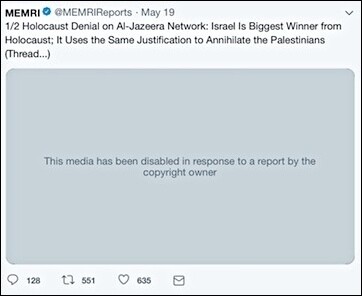Al-Jazeera doesn’t have to worry about the Twitterverse viewing and commenting on its Holocaust denial video (see it here). |
Over the weekend, Al Jazeera put out and then deleted a video that encouraged Holocaust denial. It later said it had “swiftly” deleted it and suspended two journalists. However, it is now difficult to find the video online or commentary about it because Twitter has censored it, claiming it infringes Al Jazeera’s copyright.
The Middle East Media Research Institute (MEMRI) tweeted a version of the video with subtitles on May 19. “Holocaust denial on Al Jazeera Network: Israel is biggest winner from Holocaust, it uses the same justification to annihilate the Palestinians,” MEMRI wrote, paraphrasing the video in its tweet.
But the video itself is disabled on Twitter now “in response to a report by the copyright owner.”
Journalists often rely on copyrighted material to conduct their work, and the immediate decision by Twitter to censor video of the Al Jazeera video without testing it in court illustrates a new pattern of removing material.
The use of copyright claims is a convenient way for networks to disappear embarrassing video from social media. |
The School of Government at American University maintains a website for the Center for Media and Social Impact with guidelines about how fair use of copyrighted material is important to journalists.
The website notes that “the use of textual, visual and other quotations of cultural material for purposes of reporting, criticism, commentary or discussion constitutes fair use.”
The use of claims of copyright to disappear embarrassing video produced by a network is a convenient way to now remove evidence of antisemitism online. Instead of confronting the antisemitism and the Holocaust denial, Al Jazeera appears to have decided to resort to making sure the content is not available anywhere.
Large state media will increasingly work with social media giants to remove criticism of their own journalistic practices. |
This makes it increasingly difficult for journalists to report on the subject matter, since social media giants’ platforms are now where many people get their news and information.
Labeling an edited version of the video a copyright infringement is likely a new way that large state media will increasingly work with social media giants to remove criticism of their own media practices, embarrassing videos of their leaders or even evidence of hate speech in their societies.
Historically, newspapers, television and radio would use images, sound bites or videos to illustrate segments or documentaries. If claims of copyright infringement, untested in court, will immediately result in any critical content being taken down, it will restrict freedom of the press and the ability to critique issues of national importance.
Seth Frantzman is The Jerusalem Post’s op-ed editor, a Writing Fellow at the Middle East Forum, and a founder of the Middle East Center for Reporting and Analysis.







